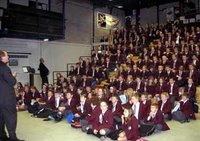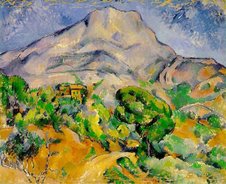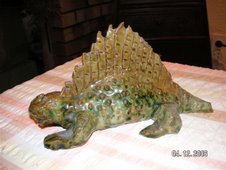I'm in full reminiscing mode today. It all began last month, reading a Peter Foster blog in the Telegraph. For him, the Taj Mahal is the world's most beautiful building. Oh yes, and there was also that revealing comment of Tony Blair's that "science for me (at school) was for people devoid of emotions, the boffins..."
About 8 years ago, I was saying exactly the same thing as Peter Foster about the Taj Mahal to a lower school assembly . But not as an exercise in pure opinion-mongering - like the CDT teacher at another school who went on for 10 minutes about the spiritual significance in his life of the colour orange ! No, I had a mission, a deadly serious one, and it had been weeks in the planning.
It happened like this. It was the autumn of 1998. The approaching millennium was starting to play on people's minds.
I had been operating for a year as a free-enterprise private tutor, and then got word that a well-known school needed a temporary science teacher. Their main concern was a GCSE examination class that had been taken in Year 10 by a brilliantly creative chemistry teacher. But exam syllabuses for him were somewhat of an inconvenience, best passed over lightly. The school wanted someone, me, to go in and crack the whip.

I was also made a Form Tutor for a Year 8 group. One fine morning, I escorted them along to a full school assembly, oblivious of what was in store.
The guy was near the top of his profession. And as he stepped forward in front of the hushed school assembly, his body language reflected the total confidence that he and the nearby headmaster had in his abilities. He was a Deputy Head of this over-subscribed Comprehensive school, one that had managed to retain the ethos of its previous Grammar school existence. One reason for the guy's confidence was that his name was carved on the plaque in the entrance hall. He had himself been a pupil there, and had risen to be Head Prefect, no less. Demi -god status at 18 ! And my, did it show !
So when he stepped forward to "give his assembly" I sat up, confidently expecting to observe a master class in how to give an inspirational pep talk , with total rapport. Little did I know that within a few minutes, I would be shocked to the core, and be seething for weeks thereafter.
His talk began innocently enough. A nationwide competition had been launched by BBC Radio 4, he said, to find the British personality of the Millennium. He reeled off a list of those who had been shortlisted. Churchill, Shakespeare, Newton, Darwin, Cromwell etc etc.
And then it came. Just like that. A bolt from the blue. Correction - a great elephant turd from on high. "We can rule out Newton and Darwin straightaway " he said. (No, there was no mischievous tongue in cheek). "No scientist, in my candid opinion, can -or should - be considered for Personality of the Millennium" .
Scientific discoveries, he said, were like buses. You wait long enough, and one is sure to come along. For real unique genius, you have to look to the liberal arts - literature (his own subject), music, art. His vote was for Shakespeare.
Could I really be hearing this, I wondered, as I cast my eyes along my own 6th form students, their eyes set on careers in scientific research ? What must they be thinking, to hear their ideals and self-esteem being dismissed, shattered even, in this fashion ?
My fellow scientists in the staffroom were clearly miffed, but resigned, and felt we should just let it pass. Least said, sooner forgotten. But they were permanent members, and it doesn't pay to offend deputy heads. But mine was a fixed length contract - one year. I could answer back. Even if they gave me a bad reference , I could always go back to tutoring. The question was how to respond ? Given that tender, impressionable minds were involved, it had to be done in a way that attacked the idea, but not the person, or his elevated status.
Each member of staff took it in turn to give an assembly. Mine was (as I recall) something like a month away. Time to think and plan carefully.
I'm not sure how the Taj Mahal idea came to me. But I knew in an instant that it was the right one (helped incidentally by the school having a sizeable number of Muslim pupils).
The Indian Information centre in London provided a huge and splendid poster of that magnificent monument. And there was a slide projector too, loaded with Isaac Newton memorabilia. Why ? I'll come to that in a minute.
 The talk, reduced here to a telegram, went something like this: Look at this picture, lads. Perfection, would you not agree ? Just look at this magnificent structure. How light it looks, as if it might float off into the sky at any minute. How was this perfection achieved. Consider the proportions - look first at its entirety - the balance between the mausuleum, its 4 towers, and then the linear ponds and gardens. A perfect blend of art and science. Look at the way the mausuleum sits on a raised plinth, that already starts to lift it skywards. Then look at the 4 towers, pointing up to the sky. Booster rockets, perhaps to the modern eye.
The talk, reduced here to a telegram, went something like this: Look at this picture, lads. Perfection, would you not agree ? Just look at this magnificent structure. How light it looks, as if it might float off into the sky at any minute. How was this perfection achieved. Consider the proportions - look first at its entirety - the balance between the mausuleum, its 4 towers, and then the linear ponds and gardens. A perfect blend of art and science. Look at the way the mausuleum sits on a raised plinth, that already starts to lift it skywards. Then look at the 4 towers, pointing up to the sky. Booster rockets, perhaps to the modern eye. It was then time to deliver the real, underlying meassage. Look closer at the ornamental gardens. Are they not pure art. The designers could be as creative as they wished. And if they didn't get the effect they wanted, first time, they could always start over again, modelling and remodelling till they felt they had achieved the desired effect.
Not so with the building. The foundations had to be right, first time. And then the plinth. Everything had to done in methodical fashion, knowing there was no going back. Yet a final glittering vision was achieved, built on a series of carefully planned stages, each one of which narrowed the range of options for what followed.
In other words, where the building was concerned, we are looking at the application of rational, empirical science, with its disciplines, its constraints. But the end result is still an incomparable work of art, and all the more so, given that in addition to pleasing the eye, it had to be stable, buildable, weather-resistant, repairable, conforming to these and numerous other practical requirements.
So let's forget about false and misleading distinctions between art and science.
At this stage in the talk, some of those lads, the sharper more alert ones, might - indeed should - have been asking themselves: hey, is Doc Berry getting at someone here. To which the the answer was, yes , indeed he was, and what is more that initial suspicion had to be reinforced.
This was not just another assembly talk, a paean to orange.
I moved into Part 2. While this building, this edifice, was going up, a young lad in Lincolnshire was having a difficult childhood. ( How fortunate that the two roughly coincided ). His father had died when he was very young. His mother then remarried, and shortly after the unloved lad was "dumped ", so to speak, onto his grandparents. I built up the idea of an unhappy childhood that made the lad a bit of a loner, who sought distraction and comfort in the physical world, but was not devoid of an emotional life, far from it. Because of rejection, his emotional life became channelled, sublimated even, away from people, into science. His name: Isaac Newton. Born 1642. So where you and I see white light, Isaac saw all the colours of the rainbow, and then proved, beyond doubt that light was a mixture of all the colours. They called him a deluded fool, who was arguing counter to common sense. He must have misinterpreted his experiments with those prisms, they said. It was the glass playing tricks, fooling the senses. But he had not. He was just ahead or his time, and out on a limb, but knew that he was right. That gave him the confidence to venture further into new areas of speculation , notably gravity, mechanics and cosmology, that some now think, myself included, were at least 100 years ahead of his time.
It was then time to introduce into the talk THE APPLE, that miserable, demeaning, trivialising symbol of Isaac Newton in the British public mind, endlessly reinforced by the media.
I refer, with geat reluctance, to that apple on the tree in his Woolsthorpe orchard, the one that may, or there again, may not, have fallen on his head producing we are told, a eureka moment. Yes, that's the question that preoccupies our media whenever the name of Newton is mentioned. Did the damn thing actually fall on his head making Isaac suddenly realise there was this force called gravity, that made apples drop to the ground, instead of, well, floating in the air, or skidding off sideways, or skywards into outer space. One can hear the modern pupil groan at this grainy mental snapshot of the young Newton, and think, is that it then ? Apples that fall to the ground, instead of doing more interesting things ?
If you go to Grantham, where Newton attended school, there's an Isaac Newton Shopping Centre. Inside there is (or was) a huge thing on the wall to celebrate the man and his achievements; And what is it ? Yes, you guessed correctly. A huge plywood (?) cut-out apple. That stupid, sodding apple. And that is it, essentially. Someone who was arguably the finest scientific mind the world has ever produced reduced to a Cox's Orange Pippin.
Let's banish from our minds all thoughts about apples, these late arrivals in the Universe's history, and possibly restricted to a single obscure planet. Let's think about big spheres, ones that have been around for hundreds of millions of years: the Earth and the Moon, the first a satellite of the Sun, the second a satellite of the Earth. And then ask ourselves this. How come the Moon orbits the earth, at roughly the same orbital radius, without being pulled in, or flying off. ? And what must one do to put a small satellite into orbit around the Earth, something not achieved until the launch of Sputnik in October 1957 ?

It was Newton who provided the answer, in a so-called thought experiment, involving a cannon on a high mountain. How many of you have heard of it ? ( only a few hands went up).

Newton's thought experiment: the cannon on the mountain top
*
Take a close look at the picture before you. Imagine a very high mountain, much taller than Everest, so high there's no air. Too high, of course, for any plane to fly, because planes need air flowing over their wings for lift. Let's say it's a thousand or even two thousand miles high . It's only a thought experiment. Now suppose that you lug a cannon up to the top, along with cannonballs and plenty of gunpowder.
Now imagine you point the barrel of cannon level with the Earth's surface and fire. What will happen ? The cannon ball will follow a curved path, falling finally to earth. No surprises there. Although there's no air to slow the cannonball, it's being pulled by gravity the whole time towards the earth. It can't stay up there for ever. Or can it ? Now suppose you use more gunpowder and fire the cannon with greater force.This time it will go further, but it will still finally hit the ground.
Do it a third time, and the same result, but the ball will land even further away. Now look at the the fourth shot in the picture. Something extraordinary has happened. The cannon ball has been fired with even more force, and is still travelling on a curved path, towards the earth, but it never hits the ground. Why not ? Because of the earth's curvature. Instead it goes completely round, and back again to its starting point. And then what ? Since there's no air, there's nothing to slow it down, so it goes round a second time, then a third time, then a fourth ...... In other words, the cannon ball is now in orbit. And it's mimicking the Moon, a much bigger satellite, that is also being constantly pulled towards the Earth, but never hits it, for exactly the same reason- because its orbital forward speed is great enough for it to hurtle endlessly around the Earth, instead of dropping onto the Earth.
So a lot of what you might have heard, or read , about being in orbit, like being weightless because of "zero gravity" for example, is totally wrong. There's gravity all right. But it's matched by speed, such that one is in free fall around the earth, making one effectively weightless, at least in relation to one's immediate surroundings, that are also in free fall. But you don't have to be in space for that to happen: you would feel weightless - albeit briefly- if you ever had the misfortune to find yourself in a faulty lift that was in free fall down a lift shaft !
So when you think of Newton, don't think of apples. Think of the Moon and satellites. Think of the planets, and the Galaxy. Isaac Newton took us out of our gardens and apple orchards, up into the Heavens, and showed that those heavenly bodies were not floating, as previously thought like bubbles, shining celestial spheres, but were all experiencing a universal force that exists across the entire Universe between collections of matter, whether solid or gas: the force of gravity.
Now you may ask: suppose Newton had died in childbirth - and he very nearly did. Would there have been another Newton, ie, like waiting for another bus to come along., as that Deputy Head so memorably put it. Yes of course, although probably much later. Newton's contemporaries, like Hooke, were smart, but not geniuses of the same mind-boggling order. And who knows, perhaps British history might have been very different as a consequence. There are some who think that it was the precocious Newton who triggered Britain' s likewise precocious Industrial Revolution, by fostering a mentality of "mind over matter", and taming matter to do labour-saving jobs for us, like pumping water out of coal mines, or getting the coal on rails from A to B. And if you can do it with coal, why not people ........
But by the same token, suppose Shakespeare had fallen into a Stratford duckpond as a toddler, and never seen his 3rd birthday, never mind his 30th. Would there be no famous figure of 16th century literature - a towering poet and playwright ? No one, of course, can answer that with certainty. I can't, and neither in my view can that quasi-philistine Deputy Head . Incidentally, he's now Headmaster, and yes, Shakespeare did win the competition, but that does not invalidate my belief that the man was wrong, and a danger to young minds. But there's a saying: cometh the hour, cometh the man. Maybe Marlowe, or someone similar, who, if they could just stay out of pub brawls, might have substituted for a prematurely-deceased Shakespeare. If scientific insights come along like buses, sooner or later, who's to say that artistic genius is not also an unsurprising detail in the fabric of space-time also?
The reaction ? From colleagues : somewhat taken aback, I think, at the emotive force - unbecoming, perhaps, a teacher of science, who was clearly taking a tilt at a member of senior management. But there was no such restraint on the part of the pupils. One said it was the most i xxxxxxxxxxx talk he had ever heard. Yes, the dreaded i word, one that we Brits avoid. To call someone an i xxxxxxxxxxx in Britain is to be semi-pejorative. But it was the reaction of another that stays in my memory to this day. Each time we passed in the corridor, he would clench his fist, and say "Yes sir. Great talk, sir". And that went on for weeks, if not months. There are few rewards, few thank you's in teaching, so I feel only a modicum of shame in recording that pupil's response in my blog.
Feel better , now you've got that out of your system, blown your own trumpet etc ?
Well actually, yes I do, now you come to mention it, hippo. Much better, thanks. Maybe you should try blogging too.
Don't put ideas into my head. Correction: don't put ideas into your head.









3 comments:
What a good thing you gave those boys a different perspective. That Dep Head really should have known better. The UK was built on great scientists, and decorated with great artists. Both serve an important role. How ridiculous to relegate science to a bus stop.
I agree with Sarah on this one. Being a teacher I'm appalled at the closed mindedness of this guy.
The one really fascinating idea to come out of the Da Vinci code was the idea of the Golden Ratio which to my literary mind at least illustrates beautifully the connection between science and art.
Angela
Hi Angela
I couldn't agree with you more about the Golden Ratio. It has almost mystical properties. In fact you've just given me an idea for another post !!!!!
Post a Comment